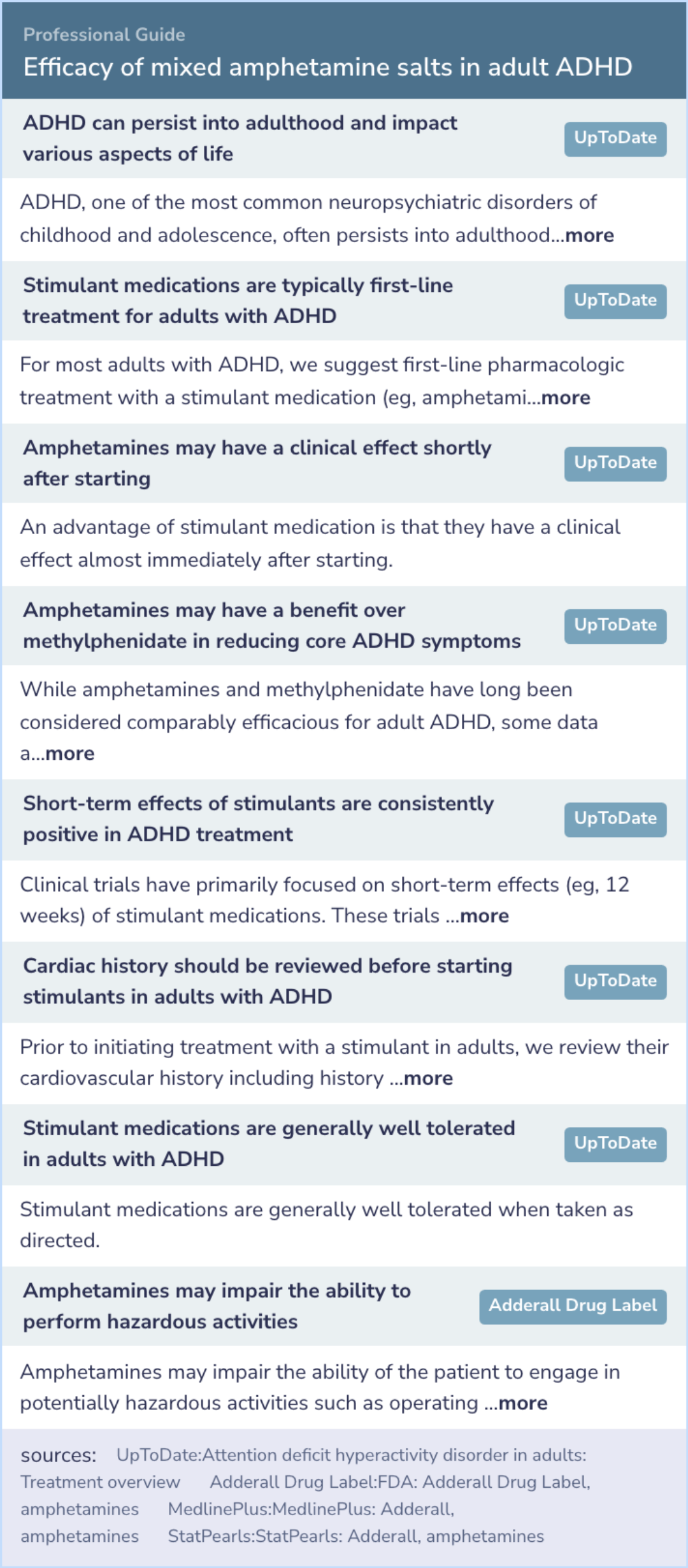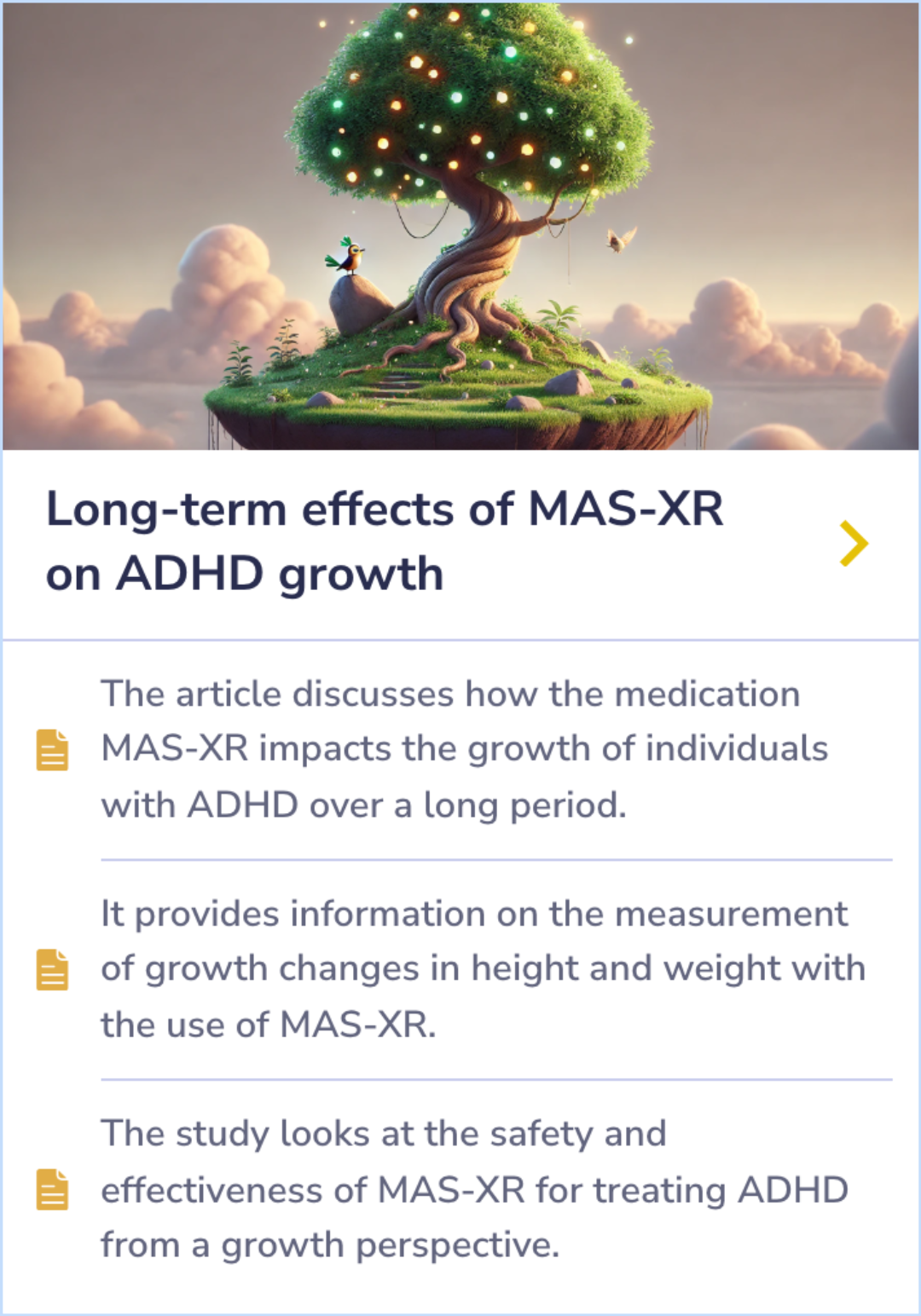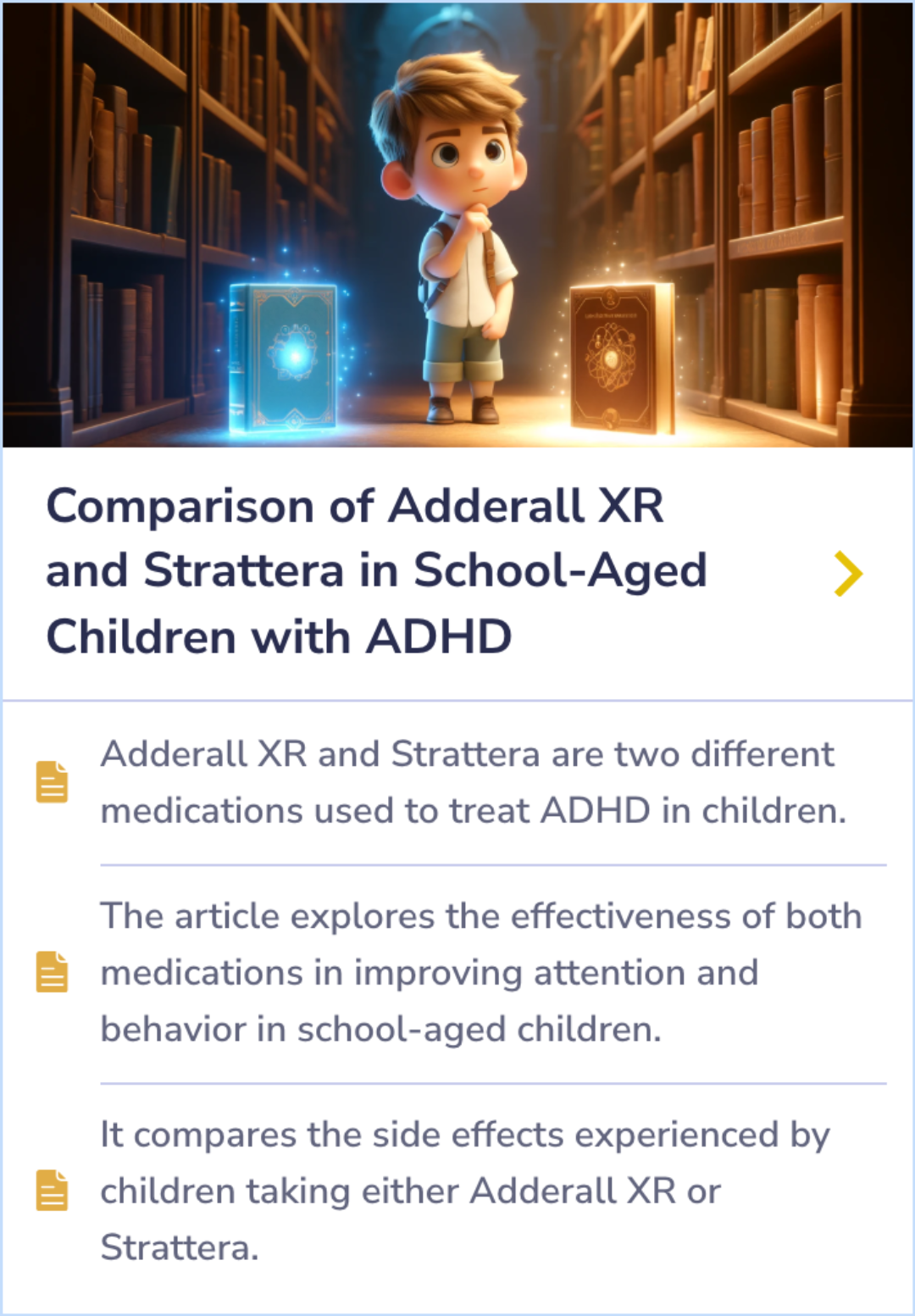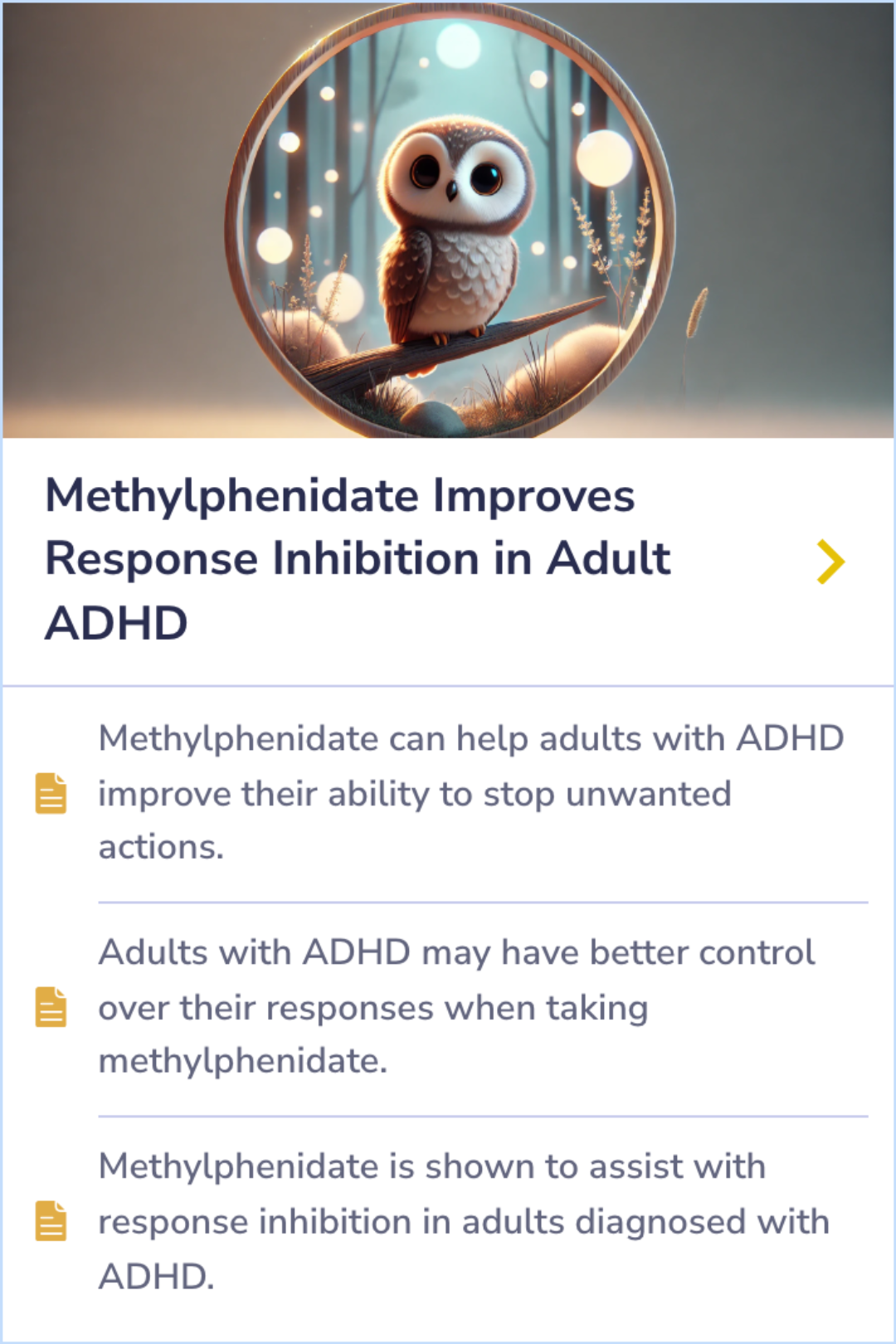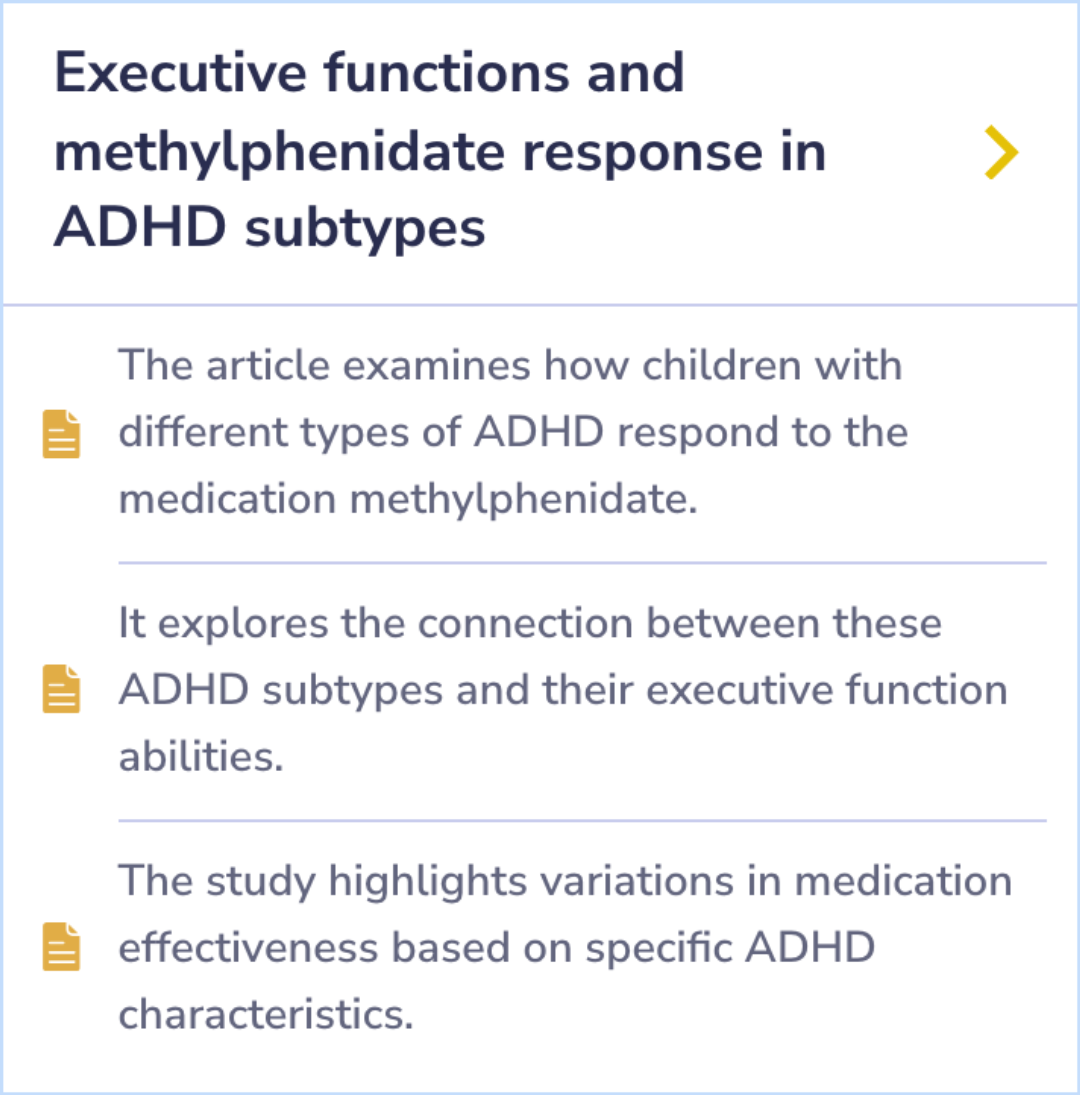Adderall Study Database
Visual Abstract
Efficacy of a mixed amphetamine salts compound in adults with attention-deficit/hyperactivity disorder
Efficacy of mixed amphetamine salts in adult ADHD
August 27, 2024
author
Spencer T, Biederman J, Wilens T, Faraone S, Prince J, Gerard K, Doyle R, Parekh A, Kagan J, Bearman SK
journal
Arch Gen Psychiatry
Date Published
2001 Aug
Why link to a visual abstract?
What is a visual abstract?
Original
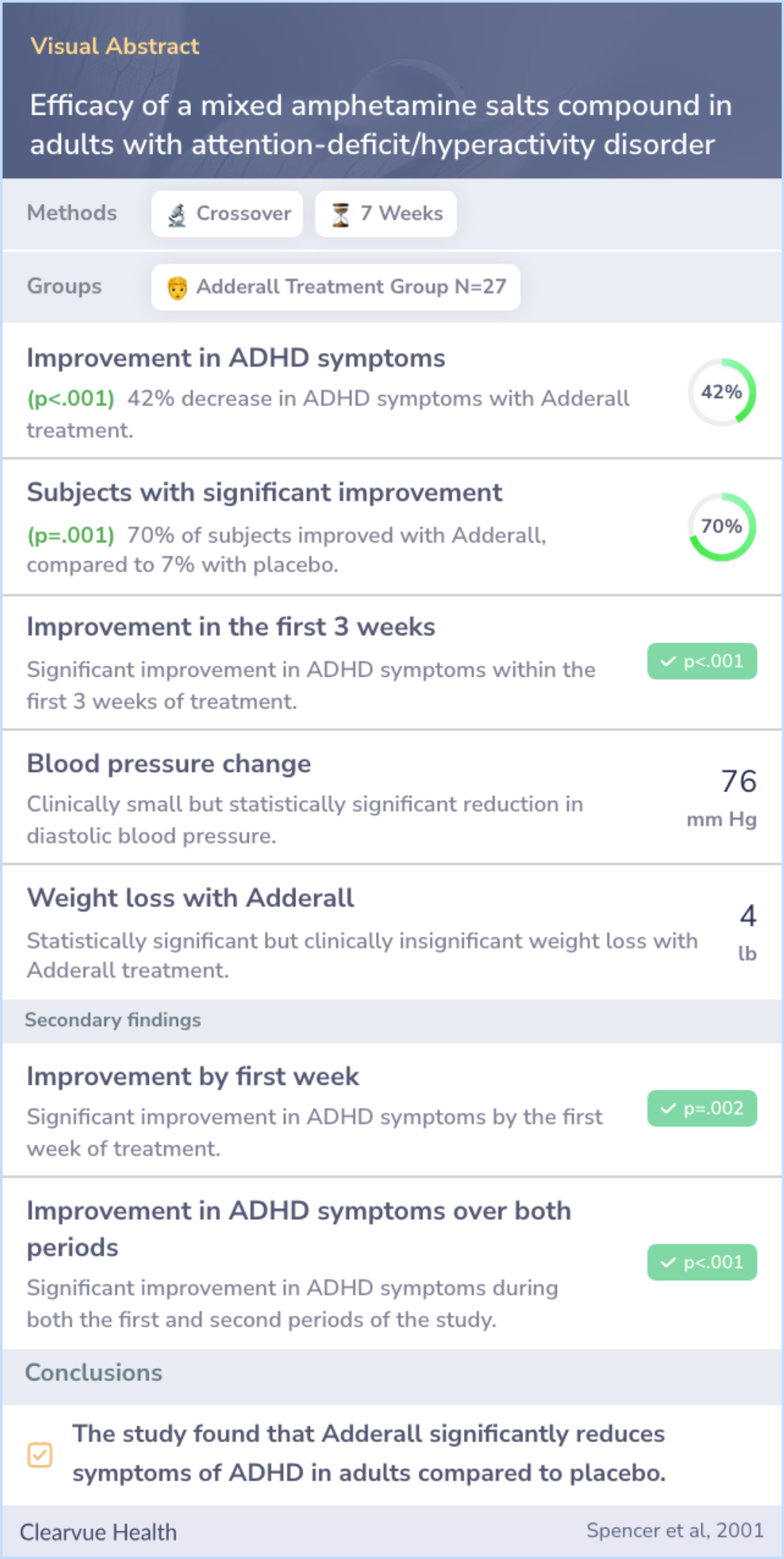
Study Summary
🔬
What They Studied
Researchers studied the effectiveness and tolerance of Adderall in treating adult ADHD.
💡
What They Found
They found that Adderall was significantly effective in reducing ADHD symptoms, with improved outcomes compared to placebo.
📚
What This Means
It aligns with current evidence that Adderall is effective for treating ADHD symptoms in adults, as it showed considerable improvement over placebo treatment.
Study Summary
Study Overview
Adderall is a well-tolerated and effective treatment for adults with ADHD. It helps increase attention and reduce impulsivity in those affected. Treatment was associated with improvements in ADHD symptoms without worsening anxiety or depression. Regular assessments of blood pressure may be needed for those taking stimulants.
Although the study confirmed the treatment's efficacy, more information on its long-term impact and effects on daily functioning is necessary. Further research can guide usage and better understand benefits versus risks in treatment plans.
Although the study confirmed the treatment's efficacy, more information on its long-term impact and effects on daily functioning is necessary. Further research can guide usage and better understand benefits versus risks in treatment plans.
Abstract: background
We report on a controlled trial of a mixed amphetamine salts compound (Adderall, dextroamphetamine sulfate, dextro-, levoamphetamine sulfate, dextroamphetamine aspartate, levoamphetamine aspartate, and dextroamphetamine saccharate) in the treatment o...more

Effectiveness of Adderall
"These results confirm the study hypothesis and suggest that Adderall is a well-tolerated and effective treatment for adults with ADHD."
Response Across Lifespan
"The similarities in drug response across the lifespan provide further support for the informativeness of trials of adults with ADHD in drug development programs for ADHD."
Need for Further Research
"These promising initial results provide support for further studies of Adderall or other amphetamine compounds in the treatment of adult ADHD using a wide range of doses over an extended period of treatment and with more detailed assessment of functioning and quality of life."
Study Summary
Methods
The researchers conducted a 7-week study, which was both randomized and double-blind, meaning neither the participants nor the researchers knew who was receiving the actual medication versus a placebo. The study involved 27 adults who met strict criteria for ADHD, with symptoms persisting from childhood into adulthood. Participants received either Adderall, at a dose titrated up to 30 mg twice daily, or a placebo in a crossover design.
The effectiveness of the treatment was measured using the ADHD Rating Scale and the Clinical Global Impression Score. Additionally, the study considered the presence of other psychiatric disorders to evaluate their potential influence on the treatment outcomes.
The effectiveness of the treatment was measured using the ADHD Rating Scale and the Clinical Global Impression Score. Additionally, the study considered the presence of other psychiatric disorders to evaluate their potential influence on the treatment outcomes.
Abstract: methods
This was a 7-week, randomized, double-blind, placebo-controlled, crossover study of Adderall in 27 well-characterized adults satisfying full DSM-IV criteria for ADHD of childhood onset and persistent symptoms into adulthood. Medication was titrated u...more

Study Summary
Results
The results showed that Adderall, administered at an average dose of 54 mg daily, was both effective and well tolerated by the participants. There was a substantial decrease in ADHD symptoms, with a 42% reduction in scores on the ADHD Rating Scale, which was statistically significant. This improvement was notable even when comparing only the first three weeks of treatment between groups.
Furthermore, 70% of participants treated with Adderall saw significant improvements, compared to just 7% of those given a placebo, highlighting the medication's potential in managing ADHD symptoms in adults.
Furthermore, 70% of participants treated with Adderall saw significant improvements, compared to just 7% of those given a placebo, highlighting the medication's potential in managing ADHD symptoms in adults.
Abstract: results
Treatment with Adderall at an average oral dose of 54 mg (administered in 2 daily doses) was effective and well tolerated. Drug-specific improvement in ADHD symptoms was highly significant overall (42% decrease on the ADHD Rating Scale, P<.001), and ...more
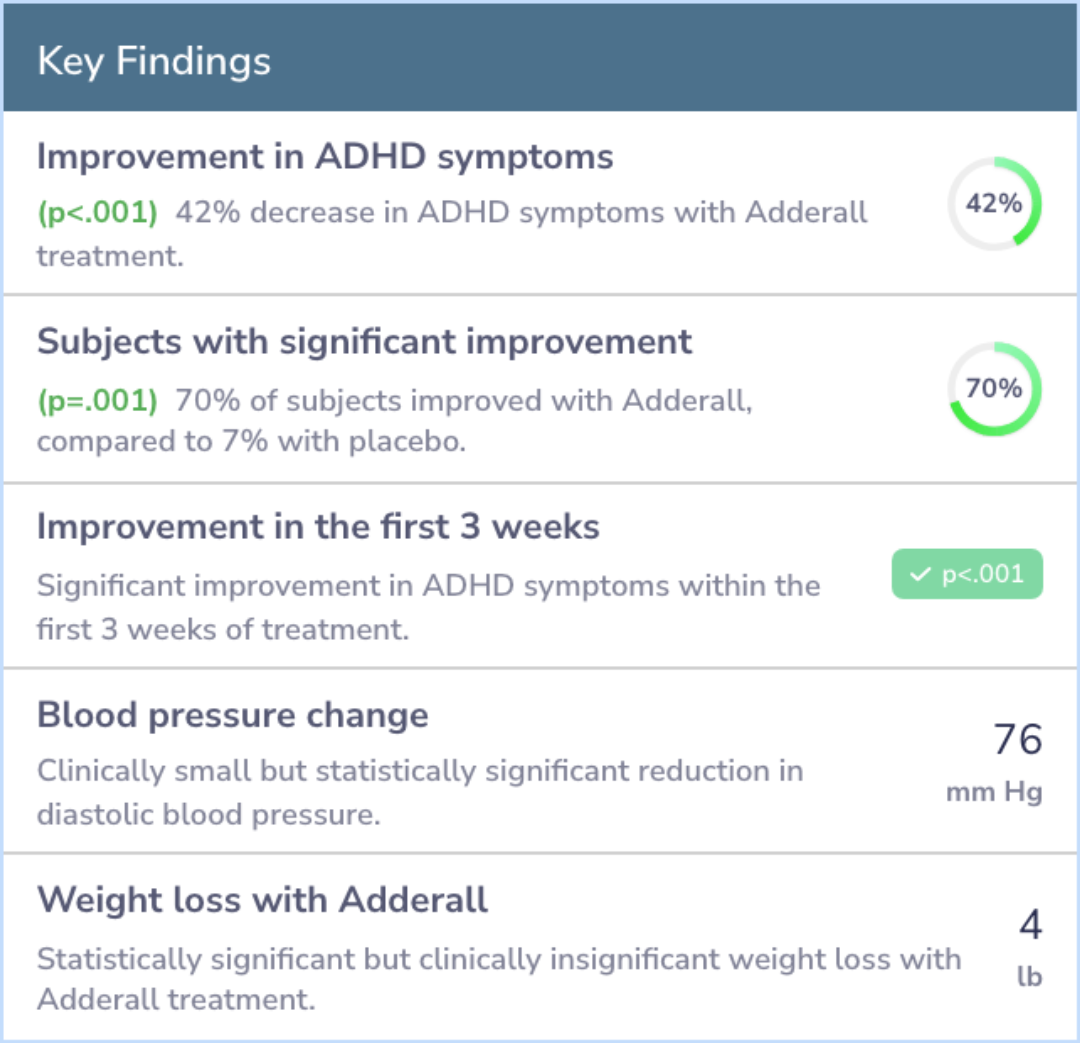
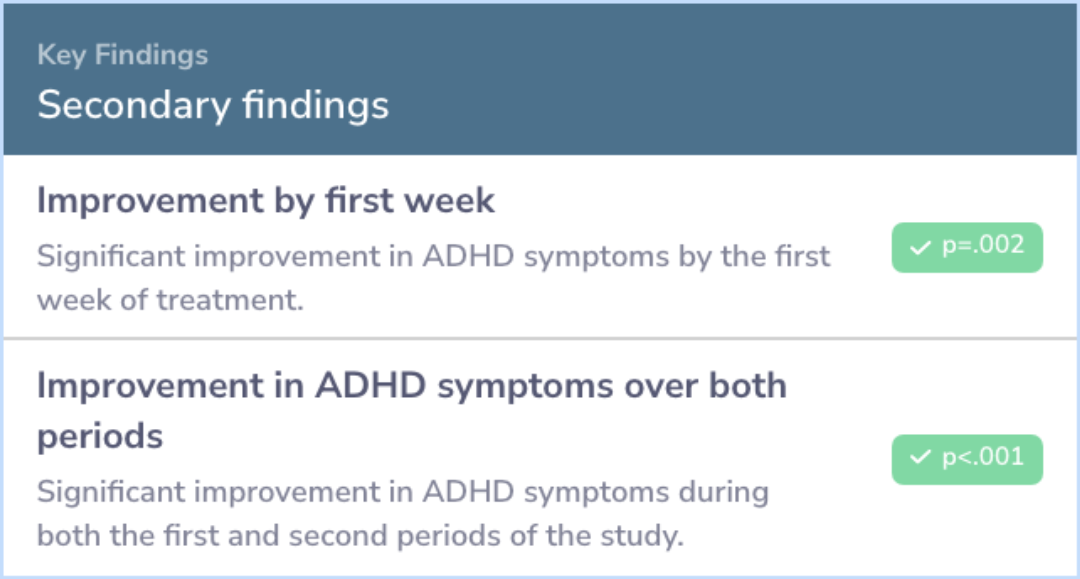
Study Summary
Conclusions
In summary, Adderall proved to be an effective and well-tolerated short-term treatment option for adults with ADHD. The study demonstrated significant improvements in symptoms, making it a promising option for those struggling with persistent ADHD from childhood into adulthood.
However, the researchers noted that further studies are necessary to understand the long-term effects of Adderall and other similar amphetamine compounds in the ongoing management of ADHD in adults.
However, the researchers noted that further studies are necessary to understand the long-term effects of Adderall and other similar amphetamine compounds in the ongoing management of ADHD in adults.
Abstract: conclusions
Adderall was effective and well tolerated in the short-term treatment of adults with ADHD. More work is needed to evaluate the long-term effects of Adderall, or other amphetamine compounds, in the treatment of adults with ADHD.
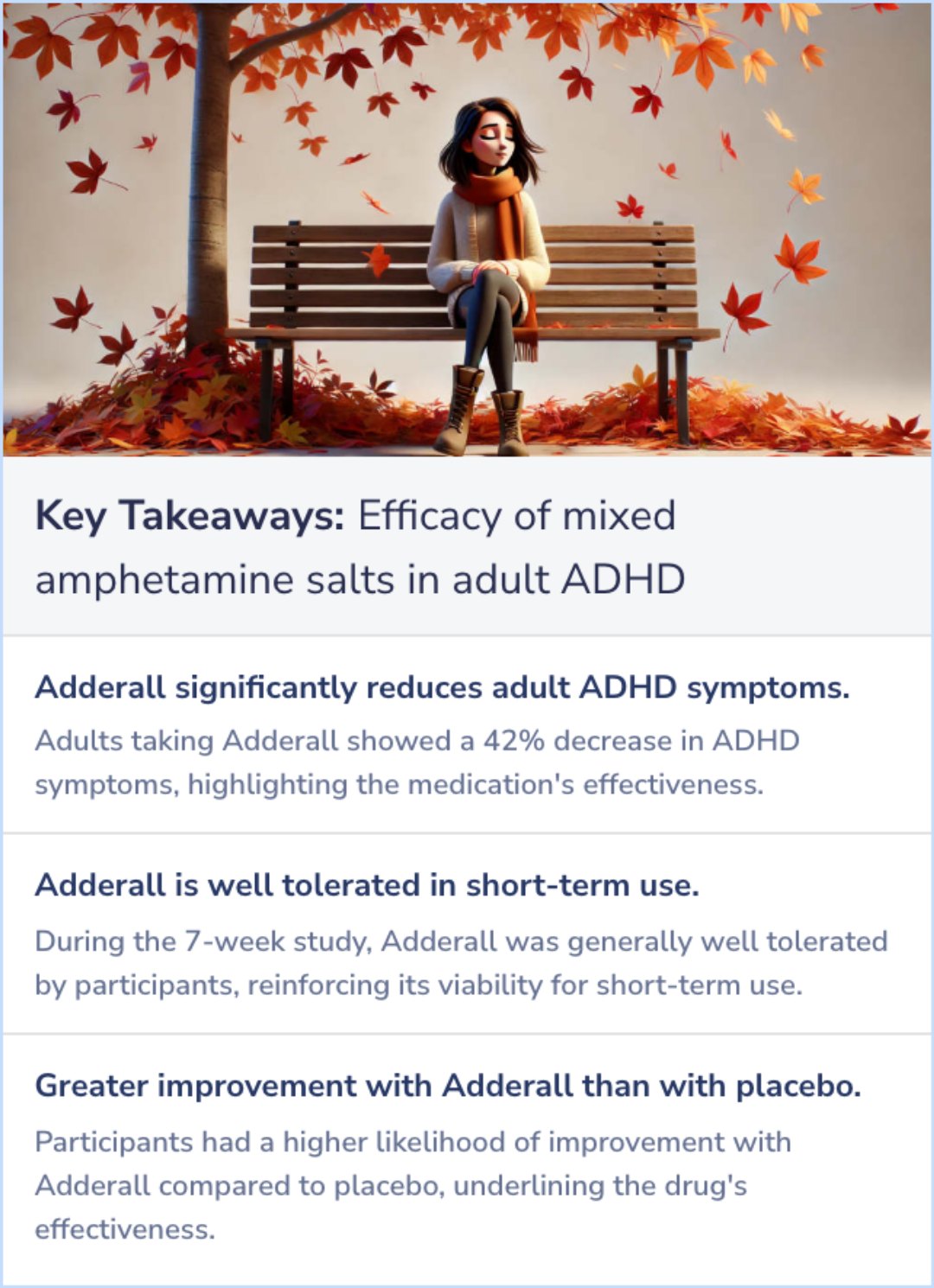
Background Information
Patient Guide
💊
FDA Approval for ADHD
Adderall is FDA-approved for treating ADHD in both adults and children, playing a role in symptom reduction.
🧬
Central Nervous System Stimulation
As a CNS stimulant, Adderall enhances brain function by increasing dopamine and norepinephrine levels.
💉
Standard Dosing Practices
Typical dosing for Adderall is adjusted between 5 mg and 40 mg daily, matched to patient's therapeutic response.
❤️
Potential Cardiovascular Effects
Adderall can raise heart rate and blood pressure; rarely, it may cause severe cardiovascular events.
⚠️
Contraindications and Risks
Contraindicated in patients with cardiovascular disease and those with a history of drug misuse.
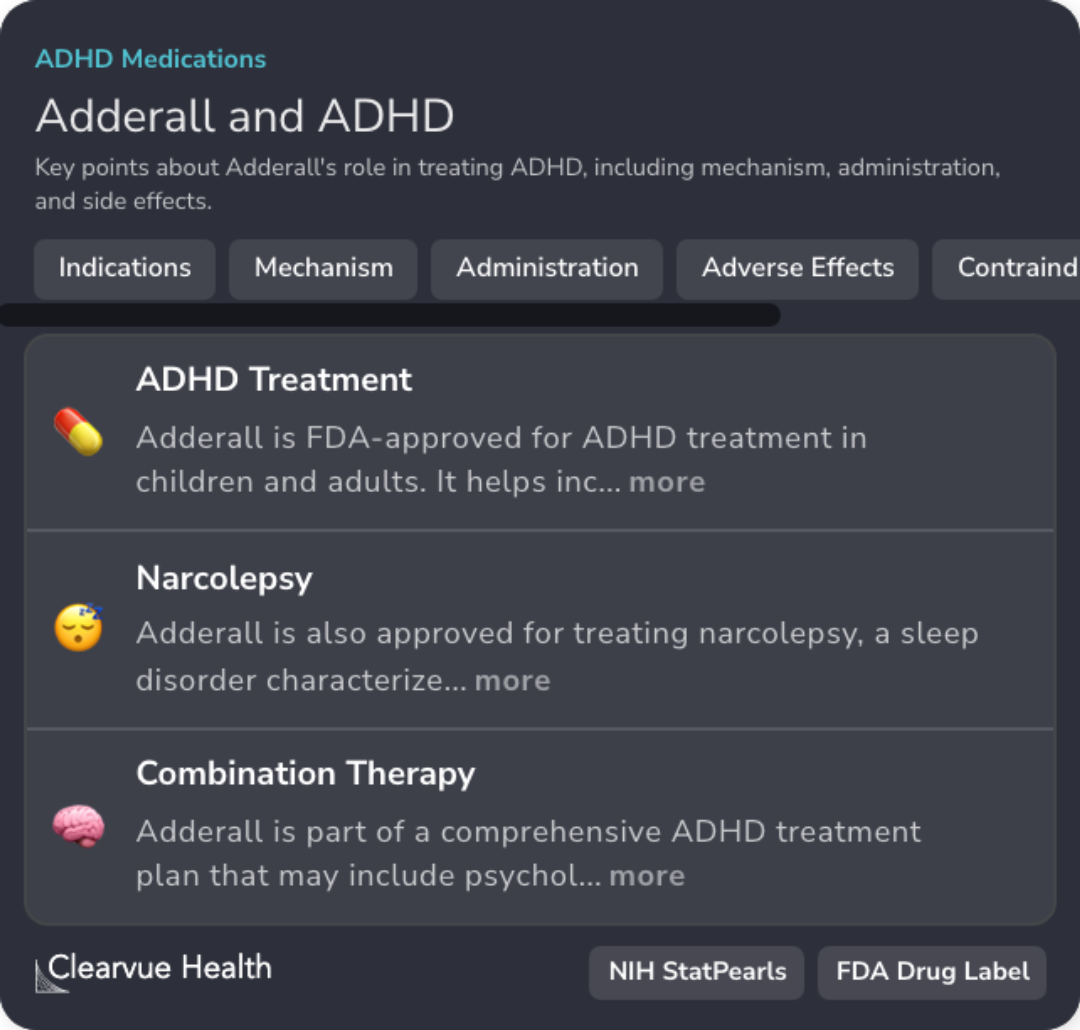
Professional Guide
Expert Opinion: Efficacy of mixed amphetamine salts in adult ADHD
In line with the abstract's findings, ADHD can persist into adulthood, significantly affecting various life areas.
Stimulant medications like amphetamines are recommended as the first-line pharmacologic treatment for adults with ADHD.
These stimulants often show clinical effects almost immediately, enhancing their practicality for symptom management.
Notably, amphetamines might reduce core ADHD symptoms more effectively than methylphenidate.
Consistent with the short-term success noted in the abstract, clinical trials frequently report positive outcomes with stimulants in such durations.
Despite their benefits, adult users should undergo a comprehensive cardiac history review before starting treatment to mitigate risks.
Stimulant medications like amphetamines are recommended as the first-line pharmacologic treatment for adults with ADHD.
These stimulants often show clinical effects almost immediately, enhancing their practicality for symptom management.
Notably, amphetamines might reduce core ADHD symptoms more effectively than methylphenidate.
Consistent with the short-term success noted in the abstract, clinical trials frequently report positive outcomes with stimulants in such durations.
Despite their benefits, adult users should undergo a comprehensive cardiac history review before starting treatment to mitigate risks.
Evidence Summary
Visualizing Treatment Response in Adult ADHD
Comparative data helps evaluate differences in treatment response among adults with ADHD. Visual representations highlight patient progress during treatment phases. Patterns and trends emerge, showing distinct trajectories depending on intervention strategies.
Such insights offer a clearer picture of treatment effectiveness, emphasizing variability and individual outcomes. This adds depth to understanding treatment impacts for ADHD management.
Such insights offer a clearer picture of treatment effectiveness, emphasizing variability and individual outcomes. This adds depth to understanding treatment impacts for ADHD management.
Evidence Summary
Adderall XR vs. Strattera: ADHD Medication Showdown
Adderall XR and Strattera, both utilized for managing ADHD in children, showcase diverse impacts on attention and behavior. Examining these medications provides insights into their effectiveness, highlighting Adderall XR's ability to enhance focus. However, each comes with distinct side effects, making their comparison vital in weighing benefits against potential drawbacks.
The article emphasizes their differing mechanisms, affecting how each influences school-aged children's daily functioning.
The article emphasizes their differing mechanisms, affecting how each influences school-aged children's daily functioning.
Evidence Summary
Methylphenidate: Enhancing Impulse Control
Methylphenidate provides promising support for adults managing ADHD by boosting their ability to suppress impulsive actions. This aid in response control allows for improved reaction management in daily situations. Adults experiencing ADHD may find heightened response inhibition, helping them prevent unwanted actions and better navigate tasks that demand focused attention and impulse control.
Evidence Summary
Analyzing Dosage and Effect Relationships in Controlled Trials
Gain insights into the comparative analysis revealing intriguing details. One focus on an aspect relating to the average dosage to measure effects. The assessment utilizes a systematic method to explore how different doses interact with effects on symptoms, providing a clearer perspective on dosage considerations.
Results highlight particular parameters, shedding light on outcomes from controlled trials, connecting measured data to underlying mechanisms examined in the study.
Results highlight particular parameters, shedding light on outcomes from controlled trials, connecting measured data to underlying mechanisms examined in the study.
